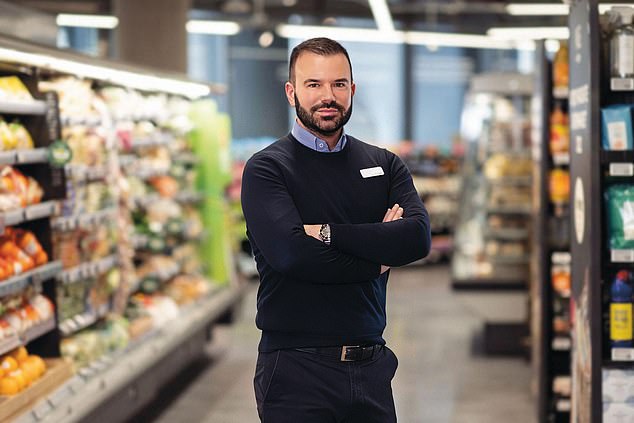Marks & Spencer’s sales rose 9.4 per cent to £13.1bn last year, thanks to excellent growth in the retailer’s food and clothing lines.
The high street icon posted adjusted operating profit growth of 33.8 per cent to £838.6m for the year to March 30, after food and clothing sales rose 13 and 5.3 percent respectively.
Buoyed by the sizeable rise in results, M&S reinstated a dividend of 3p per share on Wednesday.
The 140-year-old retailer, one of the biggest names in British business, also said on Wednesday it was confident of further progress in its new financial year.
“We are at the beginning of a new M&S,” said chief executive Stuart Machin.
“We are at the beginning of a new M&S,” said chief executive Stuart Machin.
M&S also told investors it is planning “more productive ownership”, which will see it close “older stores that are more expensive to operate and do not display the current M&S brand”.
He added: ‘The rotation towards a target stock of 180 full-line stores and 420 food stores provides a significant opportunity to invest and grow in the coming years.
“We continue to look for new sites that will allow us to accelerate store closures and create a property we are proud of by 2027/28.”
After two decades of failed turnaround attempts, M&S is finally reaping the rewards of a costly investment program to improve the quality and value of its clothing and food, improve its technology and e-commerce operations, and radically overhaul its stores. .
m&s shares rose 7.89 per cent or 21.60 pence to 295.40 pence on Wednesday morning, having risen more than 80 per cent in the last year.
The group said: “Given our track record of volume growth, market share and free cash flow, we are confident that we will make further progress in 2024/25 and beyond.”
M&S made an adjusted pre-tax profit for the year to March 30 of £716.4m, above analyst forecasts of between £665m and £705m. The previous year, the group’s adjusted annual pre-tax profit reached £453.3m.
The group said its website was “accelerating growth, attracting new customers and increasing profitability”.
The cash flow improvement of £414m helped drive “further improvement in the balance sheet and net funds position at the end of the year”, M&S added.

Optimistic: M&S is confident of continuing to make progress in its new financial year
Machin said: ‘Two years on from our Reshape for Growth plan, we can see the beginning of a new M&S.
‘We have made progress in “mainstreaming” sustainable change (how and when we execute our strategic priorities) with advances in store rotation and the supply chain.
‘However, we must move faster and be relentlessly challenging in areas where progress has been slower, building more effective digital and technological infrastructure, accelerating the pace towards a truly personalized customer experience and resetting priorities internationally.
“We have a clear plan, a clear vision for the future and we have many opportunities ahead of us.”
The group also outlined plans to bolster its online operations, which it expects to grow from 22 percent of clothing and home sales five years ago to 50 percent of sales.
It said: ‘Online growth has increased, supported by better products and more effective marketing. Despite this, profitability is still not market leading despite our scale advantage.’

Momentum: M&S announced a new 3p per share dividend on Wednesday
Charlie Huggins, quality equity portfolio manager at Wealth Club, said: ‘M&S has had an excellent year and there is now enough evidence to suggest this is not a blip.
‘The most impressive thing about M&S’ turnaround story so far has been the increase in market share in both clothing and food. They have achieved this by reducing discounts, which is a good sign.’
Mark Crouch, analyst at eToro, added: “In what has become one of the most emphatic changes seen in British retail in recent years, the story of M&S’s comeback is becoming something of a fairy tale. for investors.
‘Shares have risen more than 50 per cent in the last twelve months as the company continues the trend of attracting new customers and accelerating growth.
‘Despite inflationary pressures easing, retailers remain fully engrossed in a tug-of-war for market share, in which quality and value are proving to be key battlegrounds.
“M&S, renowned for its quality, has focused on offering customers significant value and it appears to be working.”
Russel Pointon, consumer director at Edison Group, said: “Challenges remain in the Ocado Retail Joint Venture and international segments, where adjustments are likely to be needed due to a decline in sales and rising losses.”
Some links in this article may be affiliate links. If you click on them, we may earn a small commission. That helps us fund This Is Money and keep it free to use. We do not write articles to promote products. We do not allow any commercial relationship to affect our editorial independence.


